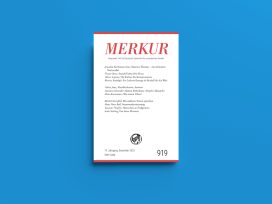
Cosmic Europe
Merkur 12/2025
Leibniz’s Europe; why majority rule is relative; social chromatics off the scale; travels in post-capitalism.
Bankruptcy in nineteenth-century parables of capitalism; billionaires, bankruptcy and the American obsession with money; and why the refusal to accept the end makes life worse.
In a biting essay for the new issue of Wespennest – topic: ‘bankruptcy’ – Philippe Roepstorff-Robiano returns to Marx’s well-known description of the driving principle of a capitalist economy: ‘All fixed, fast-frozen relations, with their train of ancient and venerable prejudices and opinions, are swept away, all new-formed ones become antiquated before they can ossify. All that is solid melts into air.’
Titled ‘Move fast, break banks’, the essay looks at how nineteenth-century literature brought forth characters whose cunning allowed them to derive the greatest possible advantage from this constantly accelerating cycle of innovation and destruction – even to the point of using bankruptcy. Balzac’s Baron de Nucingen, the upstart banker in The Human Comedy, lacks the reputation that would lead people to entrust him with their money. His solution is to fake his own bankruptcy, leading to a notoriety that allows him to manipulate investors and dupe them into pyramid schemes, thereby demonstrating that ‘the debtor is stronger than the creditor’.
Alexei Ivanovich in Dostoevsky’s The Gambler, by contrast, is not interested in money, but gambles for gambling’s sake. He is addicted to the game and poor, so that he has nothing to lose, making him the perfect gambler, always willing to stake everything. He is, in his own words, a ‘zero’. Fast-forward to the twenty-first century, where a real-life bankrupt and ‘zero’, the president of the United States, is pushing the logic of destruction beyond what the world has ever seen. His cryptocurrency $TRUMP, his decimation of rule of law, societal institutions, and government agencies, all aim at razing everything that stands in the way of ‘the zero’s agenda’ – his own gain.

The essay concludes with a critique of the false dichotomy between use value and exchange value in economic theory. Rather than exhibiting a neat division between ethically correct use value and exploitative exchange value, capitalism’s logic is ‘murderous’ through and through. It is fascism that projects ‘(evil) exchange value onto a group supposedly alien to the “national body”, whose elimination would allow for an authentic life of (good) use value’.
George Blecher thinks about what having – or not having – money does to human beings. He begins with his parents, who had diametrically opposed perceptions of ‘the money-god’. To his father, this god was benevolent, allowing him to provide his family with the comforts of a good life; to his mother, this god was ‘cruel, stingy, unkind’ and always threatening bankruptcy, starvation, death. While his father maintained the fantasy that a sufficient amount of it would come from somewhere, for her, there was never enough. Blecher’s parents are like everyone in America – obsessed with money, whether they constantly feel the need for more, or are deluded to believe they’ll always have enough.
The fantasy that money will protect us from death holds equally for those who have and those who have not. Blecher tells the stories of three of his friends, two of them haves, the third a have-not. The first two amassed extraordinary wealth, but never seemed happy or able to enjoy what their millions afforded them. The third was a writer who pursued her calling rather than financial stability. When the publishing industry changed and she was no longer in demand, she found herself without means and was forced to declare personal bankruptcy. As an elderly woman she had to face the fact that the belief she entertained throughout her life – that there would always somehow be enough money – was unfounded. This, Blecher observes, broke her. He wonders in conclusion whether bankruptcy for her was ‘just a euphemism for death’.
Karin Nungeßer’s personal account of her parents-in-law’s final years takes us step by step along the path of their downward trajectory. She begins with her discovery of chaos and soiled clothing in her mother-in-law’s closet, which leads her to confront her and her father-in-law with the unwelcome truth that the time has come for them to move into an assisted living facility. The two resist; a cleaning lady and a caregiver are hired instead.
Things don’t go well with the caregiver; she is followed by a string of others who rarely stay for long. These eastern European women are often not adequately trained for the job and don’t speak German well, while the patient’s husband treats them like servants and complains about how expensive they are. The author and her husband, the patient’s son, and his brother and wife meanwhile research nursing homes, but the father-in-law finds something not to like about all of them and insists on staying at home with his rapidly deteriorating wife.
The author notices how poorly he has begun to treat her mother-in-law, how rough he is when he gives her medicine; she is concerned about abuse. His resistance to professional care, to accepting that their formerly independent and active life is over, seems to derive from a deeply held conviction: ‘Thou shall not die.’
‘That is the only explanation I can find for their refusal, and that of so many others who were children during the war, to confront their own mortality,’ writes Nungeßer. After his wife dies, her father-in-law spends his last five years alone in his large house, bitter and suspicious of those caring for him. Nungeßer’s tale powerfully debunks the notion that anything is better than ending one’s life in a nursing home.
Review by Millay Hyatt
Published 4 November 2025
Original in English
First published by Eurozine
© Eurozine
PDF/PRINTSubscribe to know what’s worth thinking about.

Leibniz’s Europe; why majority rule is relative; social chromatics off the scale; travels in post-capitalism.

Throughout history, Belarusians have turned to their rich folklore traditions in harsh times. What may appear as a period of cultural stagnation is often a moment of resilience and creative revival. And the current wave of Belarusian folk texts, music and dance is no exception.